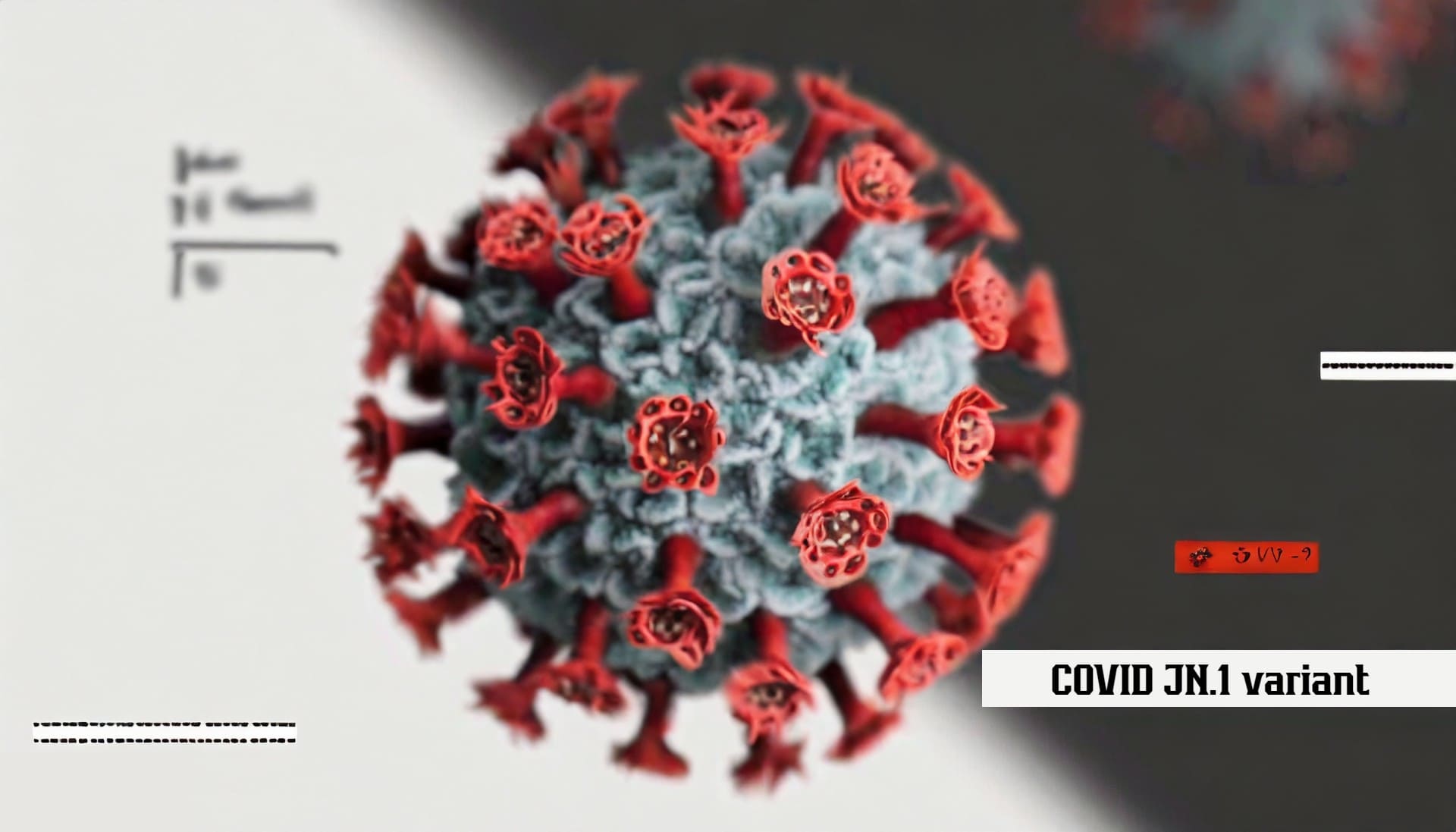Navigating the Rising Cases of COVID JN.1 Variant: What You Need to Know

The global challenges and uncertainties resulting from the COVID-19 pandemic persist as we confront the virus. Emerging variants are a new cause for concern and inquiry. Among these, the COVID JN.1 variant has drawn significant attention from public health authorities. This piece aims to delve into the origins and traits of this variant while furnishing crucial information to assist in addressing the escalating cases.
Understanding the origins and characteristics of the COVID JN.1 variant
The COVID JN.1 variant, also referred to as the JN.1 strain, is an alteration of the SARS-CoV-2 virus responsible for COVID-19. Its emergence is thought to stem from a combination of genetic modifications within the virus, leading to a novel variant with distinct attributes. Genomic sequencing, a method scrutinizing the virus's genetic composition, has enabled the identification of the JN.1 variant by pinpointing specific mutations.
One prominent feature of the COVID JN.1 variant is its heightened transmissibility. Initial investigations propose that it spreads more readily between individuals in comparison to other variants. This increased transmissibility has contributed to the swift upsurge in cases witnessed across various regions worldwide. Notably, while the JN.1 variant exhibits greater transmissibility, established preventive measures like mask usage, social distancing, and hand hygiene remain effective in diminishing transmission risks.
Key differences between the COVID JN.1 variant and other variants
While similarities exist between the COVID JN.1 variant and other SARS-CoV-2 variants, notable distinctions are evident. A primary differentiation lies in the specific mutations present in the virus's genetic makeup. These mutations can influence the variant's behavior, affecting transmissibility, illness severity, and its ability to evade immune responses.
Another crucial disparity pertains to the potential impact on vaccine efficacy. Preliminary research indicates that certain COVID-19 vaccines might exhibit slightly reduced effectiveness against the JN.1 variant compared to other variants. Nevertheless, it's vital to emphasize that vaccines still offer protection and significantly diminish the likelihood of severe illness, hospitalization, and mortality. Health authorities diligently oversee the situation and are prepared to adjust vaccine strategies if deemed necessary.
COVID JN.1 variant and its impact on the spread of COVID-19
The COVID JN.1 variant exhibits a remarkable capacity for rapid spread within communities. Its heightened transmissibility enables it to infect a larger populace in shorter durations, leading to a surge in cases. This swift proliferation presents a challenge to public health authorities in curbing the virus and preventing healthcare systems from becoming overwhelmed.
To curb the spread of the JN.1 variant, strict adherence to preventive measures is imperative. This encompasses the utilization of masks in public settings, maintaining physical distance, practicing thorough hand hygiene, and abstaining from large gatherings. Moreover, staying updated with the latest directives and recommendations from local health authorities is vital when navigating the escalating instances linked to the JN.1 variant.
Symptoms associated with the COVID JN.1 variant
The symptoms linked to the COVID JN.1 variant align with those seen in other SARS-CoV-2 variants. These include common indicators such as fever, cough, shortness of breath, fatigue, muscle aches, sore throat, loss of taste or smell, and headaches. Notably, some individuals infected with the JN.1 variant might encounter mild symptoms or remain asymptomatic, posing challenges in detection and control efforts.
If you manifest any of these symptoms or suspect exposure to the JN.1 variant, prompt COVID-19 testing is crucial. Testing plays a pivotal role in identifying cases, tracing contacts, and implementing necessary measures to hinder further transmission.
Diagnosis and testing for the COVID JN.1 variant
Diagnosing the COVID JN.1 variant necessitates specialized testing called genomic sequencing. This method scrutinizes the virus's genetic material to pinpoint specific mutations linked to the variant. Typically carried out in specialized laboratories, genomic sequencing stands as a vital tool for public health authorities in monitoring the spread and impact of the JN.1 variant.
To determine potential infection with the JN.1 variant, your healthcare provider will gather a sample, often through a nasal or throat swab. This sample undergoes transfer to a laboratory equipped for genomic sequencing. Seeking guidance from healthcare professionals is crucial for testing and diagnosis, ensuring access to accurate information and appropriate resources.
Prevention and precautions against the COVID JN.1 variant
Prevention remains pivotal in combating the spread of the COVID JN.1 variant. Consistent adherence to established preventive measures, effective throughout the pandemic, continues to diminish infection risks. These encompass:
- Mask-wearing: Utilize masks covering both nose and mouth, especially in crowded or challenging physical distancing settings.
- Physical distancing: Maintain a minimum of six feet distance from non-household individuals.
- Hand hygiene: Regularly wash hands for at least 20 seconds using soap and water, or resort to hand sanitizers containing at least 60% alcohol if soap is unavailable.
- Avoidance of large gatherings: Minimize exposure to crowded venues and events where maintaining physical distance poses difficulties.
Adhering to these precautions significantly aids in safeguarding against the COVID JN.1 variant and other viral strains, offering protection to both oneself and others.
Vaccines and their effectiveness against the COVID JN.1 variant
Vaccines have played an instrumental role in curbing the spread of COVID-19 and mitigating illness severity. Despite concerns about the COVID JN.1 variant's impact on vaccine efficacy, current indications affirm vaccines' substantial protective benefits.
Numerous ongoing studies aim to assess vaccine efficacy against the JN.1 variant. Preliminary insights suggest that although certain vaccines might exhibit a slightly reduced effectiveness, they still provide considerable defence against severe illness, hospitalization, and mortality. Notably, vaccine efficacy can vary based on the specific vaccine and individual immune responses.
Public health authorities vigilantly oversee the situation, ready to adjust vaccination strategies if necessary to address emerging variants. Staying abreast of the latest recommendations from health authorities and seeking guidance from healthcare professionals regarding vaccination remains crucial for informed decision-making.
The role of public health authorities in monitoring and controlling the COVID JN.1 variant
Public health authorities have a pivotal role in overseeing and managing the transmission of the COVID JN.1 variant. They utilize diverse strategies, such as genomic sequencing, to detect and monitor the variant's prevalence and impact. This close surveillance enables timely guidance, necessary interventions, and adaptable strategies to mitigate the spread of the JN.1 variant.
Adhering to the guidance and recommendations provided by local public health authorities is crucial. Their expertise equips them to navigate the challenges presented by the JN.1 variant. Remaining well-informed and connected to reliable information sources empowers individuals to make informed decisions and actively safeguard themselves and their communities.
Conclusion and staying informed about the COVID JN.1 variant
As the spread of the COVID JN.1 variant persists, it remains crucial to stay abreast of the latest developments, guidance, and recommendations. This understanding of the variant's origins, characteristics, and impact enables the adoption of appropriate precautions to safeguard oneself and others.
Adherence to preventive measures such as mask usage, maintaining physical distance, and practicing hand hygiene is essential. Keeping updated with the most recent recommendations from public health authorities and seeking guidance from healthcare professionals ensures access to accurate information.
Collaboratively, we can navigate the challenges presented by the COVID JN.1 variant and collectively strive to curb the virus's spread. Remaining vigilant, well-informed, and prioritizing both personal and community health is paramount in this endeavor.
CTA: For more information and resources on COVID-19 and the JN.1 variant, visit our website or consult with healthcare professionals to stay informed and make informed decisions.






